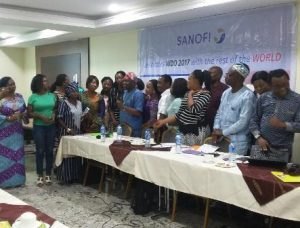World Diabetes Day: New IDF report reveals continued increase
-
Estimate shows 1 in 11 adults now live with diabetes – 10 million more cases than in 2015
-
Sanofi leads campaign in Nigeria with special walk, capacity building workshop for journalists
As the World Diabetes Day is marked globally today, the International Diabetes Federation (IDF) has released new estimates on the prevalence of diabetes around the world, indicating that 1 in 11 adults are currently living with diabetes, 10 million more than in 2015.
Data published in the 8th edition of the IDF Diabetes Atlas, launched at a high-level stakeholder event in Brussels bringing together representatives from government, the health sector and civil society, confirm that diabetes is one of the largest global health emergencies. More action is required at the national level to reduce the economic and social burden that it causes.
Diabetes, which is associated with a number of debilitating complications affecting the eyes, heart, kidneys, nerves and feet, is set to affect almost 700 million people by 2045. Over 350 million adults are currently at high risk of developing type 2 diabetes, the most prevalent form of the disease. One in two adults with diabetes remain undiagnosed, emphasizing the importance of screening and early diagnosis. Two-thirds of adults with diabetes are of working age and 8 million more adults living with diabetes are over 65 years old.
“Diabetes causes devastating personal suffering and drives families into poverty,” said Dr. Nam Cho, IDF President-Elect and Chair of the IDF Diabetes Atlas committee.
“There is urgency for more collective, multi-sectoral action to improve diabetes outcomes and reduce the global burden of diabetes. If we do not act in time to prevent type 2 diabetes and improve management of all types of diabetes, we place the livelihood of future generations at risk.”
IDF noted that diabetes has a disproportionate impact on women, the focus of IDF and its affiliated members in over 160 countries this World Diabetes Day. According to the Federation, over 200 million women are currently living with diabetes and many face multiple barriers in accessing cost-effective diabetes prevention, early detection, diagnosis, treatment and care, particularly in developing countries.
Women with diabetes are more likely to be poor and have less resources, face discrimination and have to survive in hostile social environments. Diabetes is also a serious and neglected threat to the health of mother and child, affecting one in six births and linked to complications during and after delivery.
“Women and girls are key agents in the adoption of healthy lifestyles to prevent the further rise of diabetes and so it is important that they are given affordable and equitable access to the medicines, technologies, education and information they require to achieve optimal diabetes outcomes and strengthen their capacity to promote healthy behaviours,” said Dr. Shaukat Sadikot, IDF President.
“IDF welcomes all the international commitments on diabetes that have been made over the last few years and acknowledges that some advances have taken place. However, it is clear that urgent action is still required to achieve the targets agreed by UN member states in 2013 and 2015. These include a 0% increase in diabetes and obesity prevalence; 80% access to essential medicines and devices by 2025; and a 30% reduction in premature mortality from NCDs by 2030. To this end, IDF has launched a call to action for the 2018 High Level Meeting on NCDs, calling on governments to renew their commitments and increase their efforts towards achieving the agreed targets.
“IDF is calling for all nations affected by the diabetes pandemic to work towards the full implementation of the commitments that have been made. We have both the knowledge and the expertise to create a brighter future for generations to come,” said Dr Sadikot.
IDF noted that diabetes has a disproportionate impact on women, the focus of IDF and its affiliated members in over 160 countries this World Diabetes Day. According to the Federation, over 200 million women are currently living with diabetes and many face multiple barriers in accessing cost-effective diabetes prevention, early detection, diagnosis, treatment and care, particularly in developing countries.
Women with diabetes are more likely to be poor and have less resources, face discrimination and have to survive in hostile social environments. Diabetes is also a serious and neglected threat to the health of mother and child, affecting one in six births and linked to complications during and after delivery.
“Women and girls are key agents in the adoption of healthy lifestyles to prevent the further rise of diabetes and so it is important that they are given affordable and equitable access to the medicines, technologies, education and information they require to achieve optimal diabetes outcomes and strengthen their capacity to promote healthy behaviours,” said Dr. Shaukat Sadikot, IDF President.
“IDF welcomes all the international commitments on diabetes that have been made over the last few years and acknowledges that some advances have taken place. However, it is clear that urgent action is still required to achieve the targets agreed by UN member states in 2013 and 2015. These include a 0% increase in diabetes and obesity prevalence; 80% access to essential medicines and devices by 2025; and a 30% reduction in premature mortality from NCDs by 2030. To this end, IDF has launched a call to action for the 2018 High Level Meeting on NCDs, calling on governments to renew their commitments and increase their efforts towards achieving the agreed targets.
“IDF is calling for all nations affected by the diabetes pandemic to work towards the full implementation of the commitments that have been made. We have both the knowledge and the expertise to create a brighter future for generations to come,” said Dr Sadikot.

Dr. Odeniyi (in red cap) in a group photograph with the journalists at the Sanofi Capacity Building workshop.
In Nigeria, multinational pharmaceutical giant, Sanofi Aventis lead the World Diabetes Day campaign with series of activities which included a WDD walk in Lagos and free blood sugar screening in some selected communities.
The company had on Saturday November 11 organised a Capacity Building Workshop on Diabetes for Health Journalist in Lagos With the theme “Equipping Present-day Journalists for Effective Reporting of Diabetes’’.
In the main lecture presented at the workshop by Dr Ifedayo Odeniyi, an Endocrinologist and a Senior Lecturer at the Department of Medicine, College of Medicine, University of Lagos, the journalists were informed that diabetes is a problem with the body’s handling of glucose. ever, contrary to the common notion in Nigeria that the disease is caused by excessive consumption of sugar or certain types of foods, the experts insist that “it is not sugar or foods that cause diabetes’’.
“Most people believe that when you have diabetes, it is because you eat too much sugar, this is not correct.
“Diabetes is not as a result of consuming sugar or sugary things, but rather, it is as a result of the body’s inability to handle glucose in the body.
“The glucose comes from all the food we eat whether it is meat, carbohydrate, protein or fat; so, in their normal forms, the body does not recognise them.
“The only thing the body recognises is glucose as a source of energy; when eat `eba’, `fufu’ foods prepared from cassava, rice and others, the body changes them to glucose,’’ he said.
Odeniyi added: “The body needs glucose for energy for us to move around, eyes to see, brain to function and for every part of the body to function well.
“However, before the body can make use of this glucose, one hormone is very important and that is insulin.
“After we have eaten and glucose is in the system, the pancreas produces insulin, (which lies on body cells), when the body senses there is glucose in the system.
“When it does that, the channel is opened for the insulin to go into the body cell for them to be broken down into energy, carbon dioxide and water.
“So, insulin can be likened to be the key that opens the door for the glucose to go in.
“Some people’s body may not be producing insulin at all, as in those that have Type 1 diabetes.’’
He noted that some people might be producing insulin but it is either it was not enough or was not working well enough to allow the glucose to be absorbed into the blood stream.
“This is what happens in those that have Type 2 diabetes, so, it is not the food that is causing diabetes,’’ he said.
Odeniyi, who is also an Honorary Consultant Endocinologist at the Lagos University Teaching Hospital (LUTH), said that most people believed that someone with diabetes must be on a special diet.
“There is no special diet for diabetes and there is nothing like diabetic diet.
“We hear that the diet for people with diabetes should be beans, unripe plantain and wheat.
“Diabetic patients can eat everything; the only thing that should change is the quantity of which must be regulated.
“There are so many diets but none specific for diabetes; in which ever environment one is, use the food that is culturally accepted to the patient to manage the person.
“So, as long you can control the calories, a patient can eat any type of food,’’ Odeniyi said.
Mr Oladimeji Agbolade, Head, External Affairs, Sanofi-Aventis Nigeria, said that diabetes had become a global pandemic.
According to him, as at 2015, it is estimated that 415 million adults have diabetes and it is expected to rise to 642 million by 2040.
He said that managing the disease was tedious and time-consuming but required effective management which would include taking extra care around food and exercise, as well as monitoring of blood levels throughout the day.
Agbolade urged the Federal Government to make a policy that would ensure that Nigerians were compulsorily tested for diabetes anytime they went to a hospital.
The most common types of diabetes Type 1, a chronic condition in which the pancreas produces little or no insulin, Type 2, a chronic condition that affects the way the body processes blood sugar (glucose).
Others are Prediabetes in which blood sugar is high, but not high enough to be type 2 diabetes and Gestational diabetes, a form of high blood sugar affecting pregnant women.
Workshop report by the News Agency of Nigeria (NAN)








0 Comments
No Comments Yet!
You can be first to comment this post!